AP State Board Syllabus AP SSC 10th Class English Textbook Solutions Chapter 1A Attitude is Altitude Textbook Questions and Answers.
AP State Syllabus SSC 10th Class English Solutions Chapter 1A Attitude is Altitude
10th Class English Chapter 1A Attitude is Altitude Textbook Questions and Answers
Look at the pictures and answer the questions.
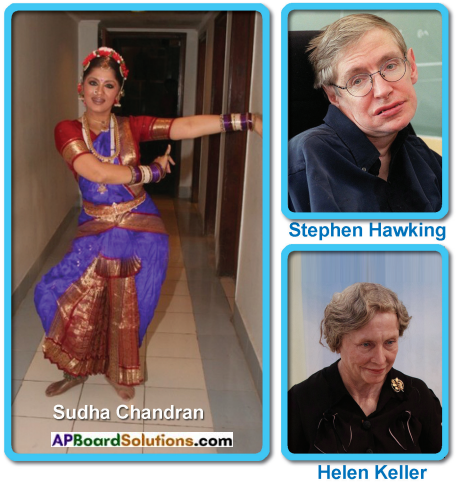
![]()
Question 1.
What qualities have made these persons great?
Answer:
The persons in the above pictures are Sudha Chandran, Stephen Hawking and Helen Keller.
Sudha Chandran is an accomplished Bharatanatyam dancer, Indian film and television actress, who showed great courage even though she had lost her leg in an accident.
Stephen Hawking is one of the famous scientists. Despite his debilitating illness, he has done ground-breaking work in physics.
Helen Keller overcame the adversity of being blind and deaf to become one of the 20th century’s leading humanitarians.
These three great persons showed that anything can be done, if one tries hard enough. From their lives, it is understood that one need not lose hope. Their lives show us that disability need not prevent one from reaching great heights. The qualities such as grit, determination, confidence, will power, dedication, discipline, etc. have made these persons great.
Question 2.
What qualities do you think a person requires to become successful ?
Answer:
The qualities a person requires to become successful are determination, dedication, discipline, grit, courage, faith, positive thinking, responsibility, hard work, commitment, desire, persistence, good character, etc. These qualities make a person highly successful.
![]()
Comprehension
I. Answer the following questions.
Question 1.
‘I call it my chicken drumstick,’ joked Nick. What does ‘it’ refer to? How does it help him ?
Answer:
‘It’ refers to the small foot that Nick has on his left hip. It helps him balance and enables him to kick. Nick uses his one foot to type, write with a pen and pick things up between his toes.
Question 2.
‘His parents decided not to send him to a special school.’ Was Nick happy about his parents’ decision? Why or why not? What do you think about this decision?
Answer:
Nick’s was not happy with his parents’ decision because there might be the risk of bullying. His companions at mainstream school might tease him.
But later, he realised that his parents’ decision was the best one. I think that this decision was the best one his parents could have made for him as he was able to achieve a degree in Financial Planning and Real Estate. The decision made him independent.
Question 3.
How did Nick’s parents help him to become independent?
Answer:
Right from the start Nick’s parents did their best to make him independent. His father put Nick in the water at 18 months and gave him the courage to learn how to swim. He encouraged Nick to get into football and skating. He taught Nick how to type with his toe at just six years old. Nick’s mother invented a special plastic device that meant Nick could hold a pen and pencil. Despite the risk of bullying, Nick’s parents insisted on his attending mainstream school.
![]()
Question 4.
Pick out the symptoms of Nick’s depression. Do you think his depression was normal or something unique about him? Give reasons for your opinion.
Answer:
Nick was deeply depressed when he was eight years old. When he was in depression, he went to his mother crying and told her that he wanted to kill himself. He felt cold and bitter. He hated God for doing this to him. He was terrified about his future without his parents. At age ten Nick tried to drown himself in the bath. These were the symptoms of Nick’s depression. I think his depression was normal. Any human being born like Nick might have the same depression.
Question 5.
Which incident in this text is funny? What makes it funny?
Answer:
Once Nick was in a car and a girl at traffic lights was looking at him interestingly. She could only see Nick’s head so he decided to do a 360 in the car seat to freak her out. When she saw the torso, she sped off really quickly. This is the funny incident in the text. The idea of Nick showing the girl his torso makes the scene funny.
Question 6.
What made Nick choose Bethany Hamilton as his teacher to learn surfing?
Answer:
Nick went to Hawaii in 2008 and met surfing master Bethany Hamilton. She had her arm bitten off by a shark when she was 12. Nick chose Bethany Hamilton as she too was a disabled person and still she performed surfing very well. Though she had no arm she did well. As a disabled person, she could know how a disabled person could learn how to surf. She could know the psychological condition of a disabled person.
Question 7.
Which aspect of Nick’s physical condition helps him to do a 360 degree spin?
Answer:
Nick has a very low centre of gravity so he has got pretty good balance. This condition helps Nick to do 360 degree spin.
![]()
Question 8.
What are the distinct features of this text? List them.
Answer:
- It is an autobiography.
- Varied sentences are used.
- Ideas are arranged in a logical sequence.
- Emotive and persuasive language is used.
- Ideas are exemplified very well.
- Cohesion is found in the text. The sentences are connected with proper linkers.
- Unity of ideas is maintained for coherence. The sentences are connected in a clear and reasonable way.
- Certain quotations and examples are given.
- Proper introduction, development and conclusion are ensured.
- The ideas are given formally and precisely.
- As far as the content is concerned, it touches the emotions of a reader.
- The content is message-oriented.
- Physical description of the main character is given properly.
- The main character’s attitudes, likes, dislikes, strengths and weaknesses are given effectively.
Question 9.
What do you learn from the life of Nick Vujicic?
Answer:
Nick Vujicic uses his life story to inspire people of all around the world. From the life of Nick, we learn that if we fail, we should try again and again until we succeed. Nick shows us that anything can be done, if we try hard enough. Undoubtedly, I feel that his life is a source of inspiration to everyone of us. He has been able to do all these because of his faith, hope, perseverance and strong will power. Nick proves that disability need not prevent one from reaching great heights. Hence I learn that we shouldn’t lose our faith and hope under any circumstances.
![]()
II. Given below are some of the statements made by Nick Vujicic. Which of these are substantiated by Nick’s life ?
- I realised why God had made us like this – to give hope to others.
- I wanted to concentrate on something good that / had.
- I tell people to keep on getting up when they fall and to always love themselves.
- If I can encourage just one person, then my job in this life is done.
Answer:
I think all the above statements are substantiated by Nick’s life.
i) I realised why God had made us like this – to give hope to others:
When Nick was 13, he read a newspaper article about a disabled man who had managed to achieve great things and help others. Nick was inspired very much by the disabled man mentioned in the article. He got a hope from him. Then he decided to use his life to encourage others and give them hope.
ii) I wanted to concentrate on something good that I had:
Nick was not discouraged with his disability. He knew that he had no arms and legs but he thought that they would never take away the beauty of his eyes. With his positive approach, he thought that his eyes were very good ones for him. He wanted to love his positive qualities such as faith, will power and perseverance. Further, he was quite satisfied with what he had, i.e. a small foot on his left hip. He said he would be lost with it.
iii) I tell people to keep on getting up when they fall and to always love themselves: If Nick fails, he tries again and again until he succeeds. When Nick was learning how to surf, he was terrified at first but later he did very well. Though he has no limbs, he always loves himself. I know this by his statement, “I decided to be thankful for what I do have, not get angry about what I don’t.”
iv) If I can encourage just one person, then my job in this life is done:
This statement was substantiated by Nick aptly. He encouraged many people in the world. He used his life story to inspire others. He made many people realise their inner beauty and personality. He was able to rise many people from the state of despair to the state of great hope.
![]()
Vocabulary
I. Look at the list of adjectives in the box. Which of them describe Nick Vujicic. Tick (✓) them.
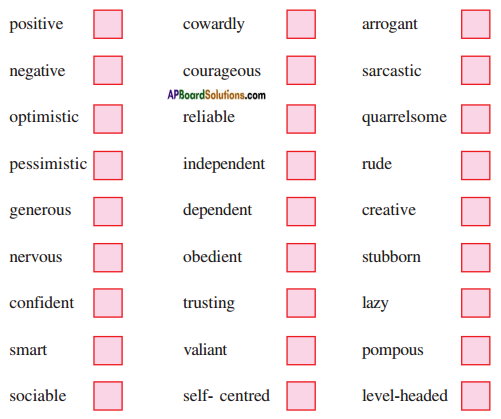
Answer:
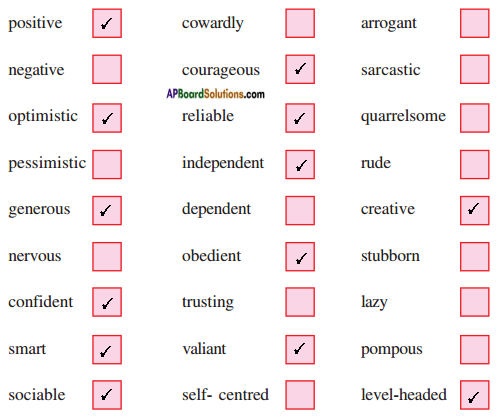
Explanation:
- positive: hopeful and confident
- negative: harmful, unpleasant or not wanted
- optimistic: believing that good things will happen In the future
- pessimistic: expecting that bad things will happen in the future
- generous: willing to give money, spend time, etc. in order to help people or give them pleasure
- nervous: worried or frightened about something
- confident: sure that something will happen in the way that you want or expect
- smart: fashionable, clever
- sociable: friendly and enjoys being with other people
- cowardly: not at all brave
- courageous: brave
- reliable: dependable
- Independent: confident and able to do things by oneself in ones own way
- dependent: needing someone or something in order to exist, be successful, be healthy, etc.
- obedient: always doing what one is told to do
- trusting: willing to believe that other people are good and honest
- valiant: very brave in difficult situation
- self-centred: paying so much attention to oneself that one doesn’t notice what is happening
- arrogant: behaving in an unpleasant or rude way
- sarcastic: saying things that are the opposite of what one means, in order to make an unkind joke
- quarrelsome: one who quarrels a lot with people
- rude: not polite and annoys others
- creative: good at using imagination to make things
- stubborn: determined not to change one’s mind when people think one is being unreasonable
- lazy: not making any effort to do anything
- pompous: trying to seem magnificent or very important; fond of display, acting too proudly, self-important.
- level-headed: sensible in making judgements
![]()
Pick out from the text the examples that support these attributes.
| Attribute | Example from the text |
| 1. Positive | In spite of his disability he has become great. |
| 2. Optimistic | He always thinks, “If I fail, I try again, and again, and again. If I can encourage just one person, then my job is done.” |
| 3. Generous | He spends most of his time delivering motivational speeches all over the world. |
| 4. Confident | Though he has no limbs, he gains faith and hope and tries to give them to others. |
| 5. Smart | He appears to be smart and shows his cleverness in learning things. |
| 6. Sociable | He enjoys being with others by delivering speeches, playing football, golf, surfing, etc. |
| 7. Courageous | Despite the absence of his limbs, he didn’t get discouraged. With great courage, he tries again and again and becomes a football player, a swimmer and a surfer. |
| 8. Reliable | He is the most reliable person. As an Evangelical Christian he has faith and gives the same to others with his motivational speeches. The people believe his reliability and are attracted towards him. |
| 9. Independent | He independently has done the things what he has wanted to do. e.g.: Playing football and golf, swimming, surfing, delivering speeches, etc. |
| 10. Obedient | He seems to be obedient in accepting the unlucky birth. |
| 11. Valiant | With great determination, he has reached a great position in his life. He becomes an international symbol of triumph over adversity. |
| 12. Creative | He also plays golf with a club tucked under his chin. |
| 13. Level-headed | He judges well when he says, “The challenges in our lives are there to strengthen our convictions. They are not there to run us over.” |
![]()
II. Given below are words that describe the positive or negative attitude of a person. Discuss them with your partner and put a tick (✓) against the positive qualities and a cross (✕) against the negative qualities.
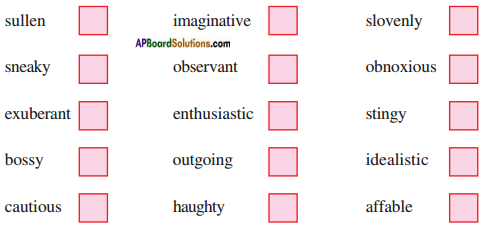

Answer:
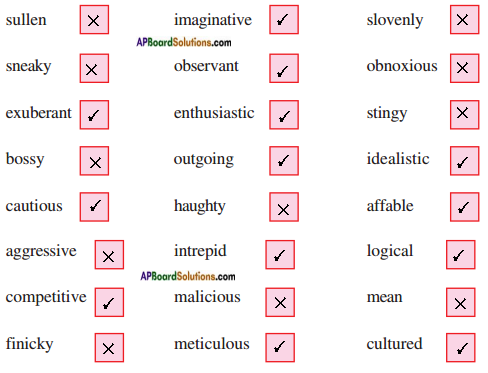
Explanation:
- sullen: angry and silent (negative quality)
- sneaky: doing things in a secret and dishonest way (negative quality)
- exuberant: happy and full of energy and excitement (positive quality)
- bossy: always telling other people what to do in a way that is annoying (negative quality)
- cautious: careful to avoid danger or risk (positive quality)
- aggressive: behaving in an angry threatening way (negative quality)
- competitive: determined or trying very hard to he more successful than other people (positive quality)
- finicky: too concerned with unimportant details and small things that you like or dislike (negative quality)
- imaginative: good at thinking of new and interesting ideas (positive quality)
- observant: good or quick at noticing things (positive quality)
- enthusiastic: showing a lot of interest and excitement about something (positive quality)
- outgoing: someone who Is outgoing likes to meet and talk to new people (positive quality)
- haughty: behaving in a proud. unfriendly way (negative quality)
- intrepid: willing to do dangerous things; fearless, brave (positive quality)
- malicious: very unkind and cruel and is trying to do harm to others (negative quality)
- meticulous: very careful about small details and always makes sure that everything is done correctly (positive quality)
- slovenly: lazy untidy and careless (negative quality)
- obnoxious: very offensive, unpleasant or rude (negative quality)
- stingy: not generous. especially with money (negative quality)
- Idealistic: believing that one should live according to high standards and principles, even when they are very difficult to achieve (positive quality)
- affable: friendly and easy to talk to (positive quality)
- logical: reasonable and sensible (positive quality)
- mean: cruel (negative quality)
- cultured: intelligent, polite and interested in art, literature, music etc. (positive quality)
![]()
III. Tick (✓) the word/expression which is nearest in meaning to the word underlined in each sentence given below.
1. Water sports aren’t Nick’s only thing – he also plays golf with a dub tucked under his chin.
a) kept
b) pulled
c) covered
d) tied
Answer: a
2. His distraught mother couldn’t bring herself to hold him until he was four months old.
a) angry
b) careless
c) shy
d) anxious
Answer: d
3. Despite the risk of bullying, his parents insisted on Nick’s attending mainstream school.
a) discrimination
b) humiliation
c) negligence
d) failure
Answer: b
4. Nick, who was teased and bullied, had an electric wheelchair for mobility, and a team of carers to help him.
a) socialising
b) movement
c) travel
d) safety
Answer: b
5. Nick managed to pull through to become an international symbol of triumph over adversity.
a) disability
b) poverty
c) difficulties
d) opposition
Answer: c
6. The challenges in our lives are there to strengthen our convictions.
a) feelings
b) practices
c) beliefs
d) characters
Answer: c
![]()
IV. Read the following descriptions about persons and fill in the blanks with the words that match with these descriptions.

1. Ashok is a very unpleasant and rude fellow. I don’t talk to him. He is ———–.
2. Srinu is very confident, elegant and polite. But sometimes he does not appear to be sincere. He is ———–.
3. Sujatha is quiet and calm. She doesn’t like to spend time with others. She is interested in her thoughts and feelings. So she is an ———–.
4. Ramesh is very sensitive. He always shows sympathy for people who are suffering. He is ———–.
5. My neighbour is such a person that he has a feeling of hatred for others. He desires to hurt others’ feelings. He is ———–.
6. My father pays careful attention to every detail. He makes thorough planning for everything in our home. He is ———–.
7. Prem is an extremely unpleasant person. He always tries to offend people. He is ———–.
8. My mother is very calm and peaceful. She doesn’t get excited or irritated easily. She is ———–.
9. Rahul is a very lively and confident person. He enjoys being with his friends. He is an ———–.
10. Sridhar is always afraid of speaking in the class. He is ———–.
Answers:
1. boorish
2. suave
3. introvert
4. compassionate
5. malicious
6. meticulous
7. obnoxious
8. placid
9. extrovert
10. timid
![]()
GRAMMAR
I. Read the text again and identify some more Defining and Non-defining Relative Clauses.
1. —————————————————————
2. —————————————————————
3. —————————————————————
4. —————————————————————
5. —————————————————————
Answer:
1. Nick has a small foot, which helps him balance. (Non-defining Relative Clause)
2. Nick, who was born in Melbourne, now lives in Los Angeles. (Non-defining Relative Clause)
3. I read about a disabled man who had managed to achieve great things and help others. (Defining Relative Clause)
4. I decided to give people the courage that the article had given me. (Defining Relative Clause)
5. Nick, who later achieved a degree, says this. (Non-defining Relative Clause)
II. Read the following sentences and circle the Non-defining Relative Clauses and put a comma/a hyphen wherever necessary.
1. The meeting which was held in the town hall was a great success.
2. The people who live in glass houses must not throw stones.
3. The teachers who have taught Abhiram say that he is an exceptionally creative student.
4. Napoleon who won the French honour died at St. Helena.
5. The silk sarees which are made in Banares are popular all over the world.
Answer:
1. The meeting which was held in the town hall was a great success. (Defining Relative Clause)
2. The people who live in glass houses must not throw stones. (Defining Relative Clause)
3. The teachers who have taught Abhiram say that he is an exceptionally creative student. (Defining Relative Clause)
4. Napoleon, who won the French honour, died at St. Helena. (Non-defining Relative Clause)
5. The silk sarees which are made in Benares are popular all over the world. (Defining Relative Clause)
![]()
III. Complete the sentences with Defining or Non-defining Relative Clauses.
1. This is the peaceful place __________________________ .
2. The Mahaprasthanam’ is a popular book __________________________ .
3. Suresh ____________________________ has left the school just now.
4. Is this the street _______________________________________________ ?
5. The express __________________________________ has just arrived.
6. The place ___________________________ has been closed to traffic.
7. This is a famous engineering college _____________________________ .
8. My sister_______________ has secured ajob as an engineer in BHEL.
9. The theatre _____________________________ was designed by Mr Rao.
10. Viswanath is one of the outstanding directors in Telugu film industry______________________ .
Answer:
1. This is the peaceful place that is liked by every naturalist.
2. The Mahaprasthanam’ is a popular book which I have bought in Hyderabad.
3. Suresh, who is mv cousin, has left the school just now.
4. Is this the street where meat is sold?
5. The express which runs between Delhi and Chennai has just arrived.
6. The place which is behind our house has been closed to traffic.
7. This is a famous engineering college that is founded by Mr. Yashwanth.
8. My sister, who has completed her education in Bengaluru, has secured a job as an engineer in BHEL.
9. The theatre which was built in 2012 was designed by Mr. Rao.
10. Viswanath is one of the outstanding directors in Telugu film industry which produces a number of creative directors.
![]()
WRITING
I. Writing a biographical sketch
A biographical sketch is an account of the life and activities of an individual. It includes information about the person’s name, place of residence, education, occupation, life and activities and other important details. It is written by another person. If a person writes an account of his/her own life, it is called an autobiography.
Given below in the table is the biographical information about Stephen Hawking. Based on this information write a biographical sketch.
| Points to be covered | Details of the person |
| Date and place of birth | January 8,1942, Oxford, England |
| Information about the family |
|
| Important events in life |
|
| Awards, prizes, honours |
|
| Contribution to his field and society | Contributed to the advancement of science and research |
Answer:
Biographical Sketch of Stephen Hawking
Stephen William Hawking is one of the greatest scientists of the world. He was born at Oxford in England on 8 January, 1942 to Isobel Hawking and Frank Hawking. He was the eldest of four sons. His father, Frank Hawking, was a medical researcher with a speciality in tropical diseases.
Hawking was recognised as a bright student. But he was not initially successful academically. During his high school years, Stephen stood the third from the bottom of his class.
Hawking used to remain with a close group of friends with whom he enjoyed board games, the manufacture of fireworks, model aeroplanes and boats. With the help of the mathematics teacher, Dickran Tahta, Hawking and his companions built a computer from clock parts, an old telephone switchboard and other recycled components when he was 16. Hawking solved rudimentary mathematical equations.
He married Jane Wilde on 14 July, 1965. The first years after their marriage were hectic. Hawking has achieved many things in the field of science in spite of his prolonged illness. He has been suffering from an incurable disease, Amyotrophic Lateral Sclerosis (ALS) which has weakened his muscles since he was 17 years old.
Stephen Hawking is known for his work regarding black holes and for authoring several popular science books. In 1974, Hawking’s research turned him into a celebrity within the scientific world when he showed that black holes are not the information vacuums that scientists had thought they were. In simple terms, Hawking demonstrated that matter, in the form of radiation, can escape the gravitational force of a collapsed star. Thus Hawking Radiation was invented.
As a mark of his eminence, Professor Hawking obtained twelve honorary degrees which he deserved. He was named a Fellow of the Royal Society at the age of 32, and later earned the prestigious Albert Einstein Award. In 1975, Hawking journeyed to Rome, where he was honoured with the Pius XI – Gold Medal for science from Pope Paul VI in 1975.
Attitude is Altitude Summary in English
This is the story of a great person, Nicholas James Nick Vujicic, who stands as an inspiration to other people with his great qualities-faith, will power and perseverance- even though he is a disabled person. His disability has not stopped him from doing what he has wanted to do. Nick Vujicic was born on 4 December 1982 in Melbourne, Australia with a rare disability called Phocomelia characterised by the absence of all four limbs. Despite the absence of his limbs, he plays football and golf, swims and surfs. He is an Australian Christian evangelist and motivational speaker. As a child, he struggled mentally and emotionally as well as physically. It was a shock to Nick’s parents that he was born without limbs. His mother was a nurse and his father was a computer programmer and accountant. His parents did their very best when they decided to send him to mainstream school despite the risk of humiliation.
Nick has a small foot on his left hip. It gives him balance and enables him to kick. With his foot, he writes with a pen and picks things up between his toes. He also plays golf with a heavy stick tucked under his chin. He is a huge fan of the English Premier League. His parents did their best to make him independent from the start. His father gave him the courage to learn how to swim by putting him in water at 18 months. His mother invented a special plastic device to enable him to hold a pen and pencil.
At age eight, Nick was deeply depressed and went to his mother crying. He told her that he wanted to kill himself. When he was ten years old, he decided to end his life by drowning himself in a bathtub but luckily he was unsuccessful in his attempt. When Nick was 13, he was inspired when he read about a disabled man who had managed to achieve great things and helped others. He understood that God had given him the life to give hope to others and so he decided to use his life to encourage other people and give them the courage. He believes that challenges strengthen our opinions. With the help of his religion, friends and family, Nick becomes an international symbol of triumph over adversity. Nick won the Australian Young Citizen of the Year award in 1990 for his bravery and perseverance. His persistence made him achieve a degree in Financial Planning and Real Estate. He went to Hawaii in 2008 and was trained in surfing by Bethany Hamilton. Nick was on the cover of Surfer magazine with his feat of doing the 360 degree spins. He is able to do this feat because of his low centre of gravity.
Nick and Kanae Miyahara, whose mother was a Mexican and father was a Japanese, got married on February 12, 2012 and on February 13, 2013 they were blessed with the birth of a healthy baby boy with full body.
Nick has travelled to over 24 countries speaking to groups of up to 110,000 people. He keeps telling the people to keep on getting up when they fall and to always love themselves. He spreads his messages of faith and hope around the world.
Nick uses his story to inspire and inform people all around the world. Nick presents values, principles, attitudes and perspectives that challenge and equip people from all walks of life to overcome their adversities.
Attitude is Altitude Glossary
stretch (v): to straighten one’s arms, legs or body
wrap (v): put ones arms around something
skateboard (n): a short narrow board with small wheels at each end, which you stand on and ride as a sport
torso (n): the main part of the body, not including the head, arms or legs
surf: to take part in the sport of riding on waves on a surfboard
despite (pre): In spite of
limb (n): an arm or leg
hip (n): one of the two parts on each side of one’s body between the top of one’s leg and one’s waist
chicken drumstick (n): the lower part of the leg of a chicken or other bird that is cooked and eaten as food
faith (n): belief or trust in God
virgin (n): someone who has never had sex
modest (adj): shy about attracting sexual interest
publicist (n): someone whose job is to make sure that people know about a new product, film, book, etc.
club (n): a heavy stick with one end thicker than the other
tuck (v): to put something into a space
distraught (adj): so upset and worried
bully (v): to threaten to hurt someone or frighten them
bullying (n): humiliation
carer (n): someone who looks alter an old or ill person at home
wall-mounted (adj): attached to a wall
pump-action (adj): a pump-action piece of equipment is operated by pulling or pressing a part in or out. so that the contents come out in short bursts
drown (v): to die from being under water for too long time
lack: to not have something that one needs
triumph (n): an important success or victory
adversity (n): a difficulty or unpleasant situation
Inspirational (adj): providing encouragement or new ideas for what one should do
conviction (n): a very strong belief or opinion
run over (phr.v.): to hit someone or something with something (a vehicle, challenge, etc.) and drive over them
perseverance (n): the quality of continuing to try to achieve a particular aim despite difficulties
give somebody the eye (n.phrase): to look at someone in a way that shows one thinks they are sexually attractive
freak out (phr.v.): make someone very anxious. upset or afraid
amazing (adj): (here) very good
spin (n): an act of turning around quickly
centre of gravity (n.phrase): the point in any object on which it can balance